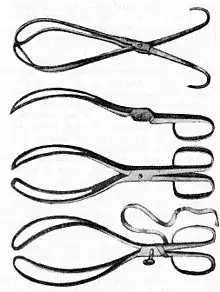I really like this question since it presents unique challenges. The question of whether it would be physically possible to practice enough of modern medicine in a medieval setting to be useful has been well addressed in a number of answers. I want to talk about the social difficulties which are far more formidable.
The question proposes that she "embark on a public health program" and refers to training others. This implies far more than visiting the sick and working as a midwife. She must somehow establish herself as an authority on medicine able to persuade others to implement her ideas. Obtaining supplies and avoiding an accusation of witchcraft are the least of her problems.
First of all, the unswerving support of a powerful noble is not something that can be conjured out of thin air. I suppose you could have her save his heir, but how does she, a woman, a total stranger, without known medical qualifications, get near the heir in the first place?
If she overcomes this difficulty and performs the miracle cure, she will have earned the eternal gratitude of the nobleman and his wife, but she will have alienated all the attending physicians she pushed aside. These will, with considerable justification, consider her a dangerous charlatan. They may have medical degrees, whereas she (as far as they know), has none. They known modern medical terminology and theory, whereas she does not. This is not the best way to start influencing medical practice. The nobleman could protect her physically, but he is not a former of medical opinion either. I would strongly suggest she attach herself to the nobleman's household in some other way and enter medicine in a less threatening manner.
This means she must either get hired as a servant or become a companion to either his wife or daughters. I suppose she could use forged letters of introduction or something like that. Other options are limited. If she could somehow marry him she could start practicing medicine among his tenants. There aren't really any other options. If he were to sponsor her without a good explanation, then she either would be or would be perceived as his mistress. That does not sound like a route to to power and influence.
Having attached herself to the females of the noble's household, she needs to work on her medical credibility. As I said above, visiting the sick and the poor the the best way to do this. The established (male) medical profession is unlikely to see this as a threat. In fact, they are likely to see such dirty work as beneath their dignity.
If all goes well, her visits will be appreciated and other women may join her. If she is really good, she might be able to jump start the nursing profession as Florence Nightingale did in the 19th century. It might be acceptable for her to organize women in this manner in the name of Christian good works. She will have to be very careful how she does this in order to remain within the bounds of socially acceptable behavior for respectable females. She must not be perceived as immodest or unchaste. If she is perceived as having never been married (and hence a virgin), she must never go anywhere unless she is accompanied by a respectable female such as the nobleman's wife or daughters. If she passes herself off as a widow, she will have somewhat more freedom.
Establishing a reputation for practicing competent medicine will not be a walk in the park. Many of her ideas will be novel, almost impossible to explain convincingly, and may require people to forgo medical treatments (such as bloodletting) which they have been told are life-saving. She will have to be creative in how she explains things. She will not be able to dispel mistaken notions about the cause of disease, only supply new ones to keep alongside them. When she starts her campaign for better sanitation, she should quote from the Mosaic law in the Bible.
This is already an very ambitious plan. But barring unlikely developments, it would almost certainly be underappreciated and die out shortly after her death. The deliberate avoidance of confrontation with the established (and male) medical community would deprive her efforts of lasting influence.
If you need the unlikely developments for your story, I suggest you have her meet a broad-minded medical student whom she can convince of the value of her approach and subsequently marry. She then feeds him enough medical knowledge to make him a star professor and spreads her ideas through him. She has to marry him for the simple reason that this is the only way she can spend the necessary time with him while remaining a respectable (and hence influential) member of society.
This means that her husband the professor will receive almost all the credit for her accomplishments. The students and other faculty members will almost certainly have some idea what is going on, but the fact that it is a male standing in the front of the lecture hall while she "assists" him will allow everyone to save face.
This last part is particularly shocking to us moderns. I suppose she can take comfort in the fact that the ideas are not her own anyway. Any form of this plan will require an unbelievable cultural adjustment in which she must learn to go along with and pay lip service to ideas which she finds totally alien and even repellent. But here is no other way. Her mission requires unbelievable self-sacrifice and this will be a big part of it.

what can she do in terms of treating people with the available materials?" - despite "the patronage of a powerful, rich noble`", the sad fact is that the simple best thing that she can do is to try to pass as male :-( – Mawg says reinstate Monica Mar 11 '20 at 06:14